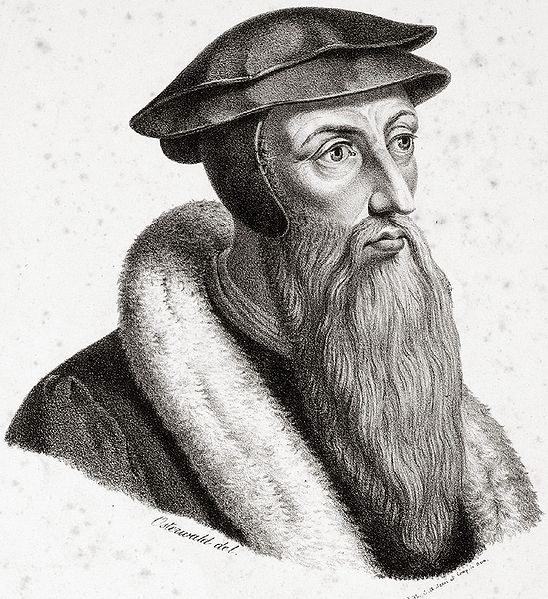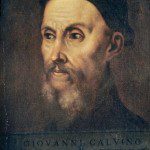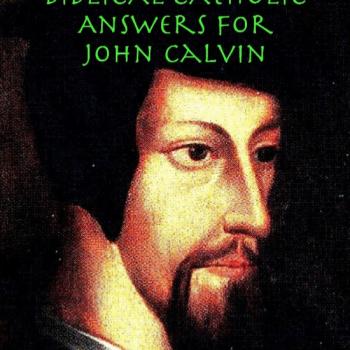Calvin, by Georg Osterwald (1803-1884) [public domain / Wikimedia Commons]
It’s usually thought that, among the founders of Protestantism, Martin Luther was the most (relatively) “Catholic” and “traditional.” That is true; however, it may surprise many to know how many traditional (literally or substantially Catholic) beliefs that John Calvin also retained. He was probably even more influential on the history of subsequent Protestantism than Luther was. The following quotes were all taken (save #2 and #1) from his quintessential work, Institutions of the Christian Religion (translated by Henry Beveridge for the Calvin Translation Society in 1845, from the 1559 edition in Latin; reprinted by Wm. B. Eerdmans Publishing Co.: Grand Rapids, Michigan, 1995; available online).
I don’t intend to imply that Calvin agrees with Catholics in every jot and tittle of all the following categories. What is agreed-upon is what is actually stated in these particular comments, which may sometimes be a part of a doctrine or practice. Two parties can agree, for example, on the basic fundamentals of a question, and then go on to differ on more minute particulars that each feels are a logical extension of the premises.
All the citations below were included in the extensive, 66-page compilation at the end of my book, Biblical Catholic Answers for John Calvin. I have a much more extensive list of 50 “Catholic” Calvin beliefs; see also my web page on John Calvin.
* * * * *
15. Calvin thought that the Church had the power of excommunication: “[T]he Church binds him whom she excommunicates, not by plunging him into eternal ruin and despair, but condemning his life and manners, and admonishing him, that, unless he repent, he is condemned.” (Institutes, IV, 11:2)
14. Calvin believed that there was no salvation outside the Church: “[B]eyond the pale of the Church no forgiveness of sins, no salvation, can be hoped for, . . .” (IV, 1:4)
13. Calvin thought weekly Holy Communion was the minimum frequency: “[T]he sacrament might be celebrated in the most becoming manner, if it were dispensed to the Church very frequently, at least once a-week.” (IV, 17:43)
12. Calvin believed in the primacy of St. Peter, as leader of the apostles: “ There is no senate without a consul, no bench of judges without a president or chancellor, no college without a provost, no company without a master. Thus there would be no absurdity were we to confess that the apostles had conferred such a primacy on Peter.” (IV, 6:8)
11. Calvin accepted the primacy of the Roman Church in early Christian history: “I deny not that the early Christians uniformly give high honour to the Roman Church, and speak of it with reverence. . . . pious and holy bishops, when driven from their sees, often betook themselves to Rome as an asylum or haven. . . . It therefore added very great authority to the Roman Church, that . . . [it] adhered more firmly to the doctrine once delivered, . . .” (IV, 6:16)
10. Calvin believed in the indefectibility of the Church: “I always hold that the truth does not perish in the Church . . .” (IV, 9:13)
9. Calvin utterly detested denominations and sectarianism: “Hence the Church is called Catholic or Universal (August. Ep. 48), for two or three cannot be invented without dividing Christ; and this is impossible. All the elect of God are so joined together in Christ, that as they depend on one head, . . .” (IV, 1:2)
8. Calvin thought that sacraments produce real, beneficial effects in us: “They, by sealing it to us, sustain, nourish, confirm, and increase our faith.” (IV, 14:7) / “That sacred communion of flesh and blood by which Christ transfuses his life into us, just as if it penetrated our bones and marrow, . . .” (IV, 17:10)
7. Calvin taught that there was such a thing as a holy, sacred place: “. . . as if it were not in the power of God in a manner to descend to us, that he may be near to us, and yet neither change his place nor affect us by earthly means, but rather, . . . raise us aloft to his own heavenly glory, . . .” (IV, 1:5)
6. Calvin believed that human beings could be distributors or mediators of salvation: “In short, in several passages he [St. Paul] . . . attributes to himself the province of bestowing salvation (1 Cor. 3:9).” (IV, 1:6)
5. Calvin accepted the notion of baptismal regeneration: “. . . forgiveness, which at our first regeneration we receive by baptism alone . . . we are washed from our sins by the blood of Christ.” (IV, 15:4)
4. Calvin approved of bodily mortification as a spiritually beneficial practice: “In like manner, therefore, as persons accused were anciently wont, . . . to humble themselves suppliantly with long beard, dishevelled hair, and coarse garments, . . . the assembly, and weeping and fasting, and the like, undoubtedly belong, in an equal degree, to our age, whenever the condition of our affairs so requires.” (IV, 12:17)
3. Calvin believed that there was a profound causal connection between Holy Eucharist and salvation: “Nay, the very flesh in which he resides he makes vivifying to us, that by partaking of it we may feed for immortality. . . . by this food believers are reared to eternal life.” (IV, 17:8) / “[T]he true and substantial communication of the body and blood of the Lord, . . . are received not by the imagination or intellect merely, but are enjoyed in reality as the food of eternal life.” (IV, 17:19) / “[I]t not only gives our minds undoubted assurance of eternal life, but also secures the immortality of our flesh, . . .” (IV, 17:32)
2. Calvin held that contraception was gravely sinful: “I will contend myself with briefly mentioning this, as far as the sense of shame allows to discuss it. It is a horrible thing to pour out seed besides the intercourse of man and woman. Deliberately avoiding the intercourse, so that the seed drops on the ground, is double horrible. For this means that one quenches the hope of his family, and kills the son, which could be expected, before he is born. This wickedness is now as severely as is possible condemned by the Spirit, through Moses, that Onan, as it were, through a violent and untimely birth, tore away the seed of his brother out the womb, and as cruel as shamefully has thrown on the earth. Moreover he thus has, as much as was in his power, tried to destroy a part of the human race. When a woman in some way drives away the seed out the womb, through aids, then this is rightly seen as an unforgivable crime. Onan was guilty of a similar crime, by defiling the earth with his seed, so that Tamar would not receive a future inheritor.” (Commentary on Genesis [38:10], translated by John King)
1. Calvin accepted the traditional Catholic and scriptural belief of the perpetual virginity of Mary: “[On Matthew 1:25:] The inference he [Helvidius] drew from it was, that Mary remained a virgin no longer than till her first birth, and that afterwards she had other children by her husband . . . No just and well-grounded inference can be drawn from these words . . . as to what took place after the birth of Christ. He is called ‘first-born’; but it is for the sole purpose of informing us that he was born of a virgin . . . What took place afterwards the historian does not inform us . . . No man will obstinately keep up the argument, except from an extreme fondness for disputation.” (Harmony of Matthew, Mark & Luke, Geneva, 1562, Vol. I, p. 107; from Calvin’s Commentaries, translated by William Pringle, Grand Rapids, Michigan: Eerdmans, 1949) / “[O]ur Lord Jesus Christ is called the first-born. This is not because there was a second or a third, but because the gospel writer is paying regard to the precedence.” (Sermon on Matthew 1:22-25, published in 1562 in the shorthand notes of Denys Ragueneau; cited in Max Thurian, Mary: Mother of All Christians, translated by Nevill B. Cryer, New York: Herder & Herder, 1963, pp. 39-40)
[see much more on this question of Calvin’s view on the perpetual virginity of Mary; a view which is confirmed by several Calvin scholars]














